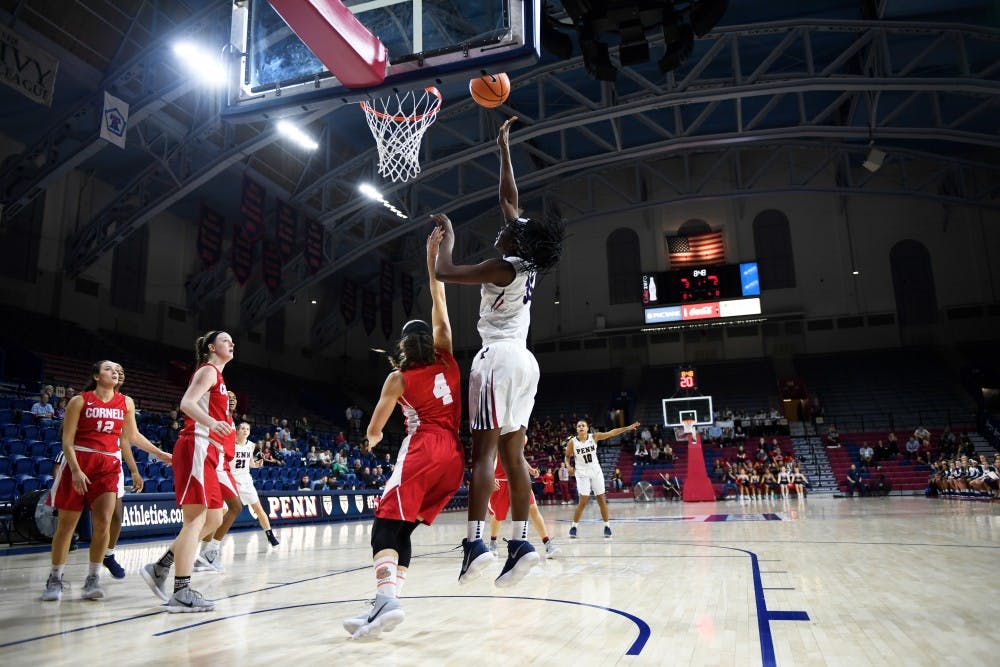Penn women’s basketball put the rest of the Ivy League on notice with Friday’s 68-48 home victory against Cornell. The Quakers, while not playing a perfect game, took a step in the right direction with their first Ivy victory of the young season. Here are four takeaways from the action at the Palestra:
Penn knows how to bounce back
Following the Ivy League opener in which the Quakers fell to Princeton by 15 points, all eyes turned to how the team would respond in its next matchup versus Cornell. If there was any doubt after the Princeton game that Penn is one of the favorites in the conference, it was erased by the Quakers’ dominant performance against the Big Red. Penn raced out to an early 12-2 lead and never looked back. This type of showing is a testament to the mental strength and experience of the group. Instead of being bogged down by their subpar performance last weekend, the Red and Blue used it as fuel in Friday’s beatdown of Cornell.
Penn played with high energy from start to finish, hounding the Big Red with stifling defense and hustling to grab loose balls. All in all, the Quakers, who seemingly got a hand on every pass, made Cornell uncomfortable and forced 20 turnovers in the ballgame. Penn also did a tremendous job of racing to 50-50 balls, keeping many possessions alive. This hustle play led to 14 second-chance points and 12 steals for the Red and Blue, as everyone on the court had a nose for the ball.

Penn’s size will be a problem for other Ivy teams this season
Freshman Eleah Parker is a force on the low block. That’s been true in the past several games, and it was undoubtedly the case on Friday. Nobody on the Cornell roster could slow her down, and no one was able to shoot over her. Aside from her 15 points, 10 rebounds, and two blocks, Parker’s presence forced the Big Red to take numerous contested shots, leading to a meager 20 percent shooting for Cornell in the first half. The Big Red shot just 31.5 percent from the floor over the course of the game.
Senior forward Michelle Nwokedi added to the defensive effort with a block party of her own. Nwokedi swatted a total of six shots, the third time this season that she has reached that mark in a game. Offensively, as has been the case for her whole career at Penn, Nwokedi continues to be nearly unguardable. On Friday, she totaled nine points and seven rebounds. But perhaps most impressive were the seven dimes that she dropped. Nwokedi, who attracted much attention from Cornell’s defense, was able to distribute the ball to her teammates when being double-teamed, finding her counterpart Parker for easy baskets on multiple occasions. On both sides of the floor, Ivy League competitors will be hard-pressed to find players who can handle Parker and Nwokedi.
Penn might be deeper than ever — but subs weren't perfect
The strong performances of Parker and Nwokedi were just part of the winning formula for Penn on Friday. In total, 10 Quakers players scored points in what was truly a team effort. While Penn did struggle during a stretch where mostly bench players were in the game, the team played solid basketball when there was a mix of starters and reserves on the floor, and coach Mike McLaughlin acknowledged this fact.
“I should have done a better job of getting [the reserves] minutes but putting them out there with more experienced players,” McLaughlin said. “I had four or five players out there [during the 13-0 Cornell run in the third quarter] that would have succeeded if they were out there with a veteran.”
Despite that sequence in which the Quakers struggled, it was apparent that the less experienced players matched the defensive intensity that the starters played with. If Penn can continue to get its bench significant minutes, the role players will become even more comfortable with the system, and the Red and Blue will be an even more cohesive unit later on in the season.
The Quakers will need to improve their ball security
Although Penn came away Friday with a 20-point victory, there are still improvements that must be made if the Quakers want to be competing in the NCAA Tournament come March. Most importantly, the Red and Blue must do a better job of making clean plays with the basketball and passing the ball with more purpose. In all, Penn turned the ball over 19 times, a number that might have been costly if it had been playing against a better team. One silver lining in terms of Penn’s turnovers is that the team was still able to play dominant basketball, even while being sloppy at times. With it being early in Ivy League play, the Red and Blue have time to cut down on the turnovers, which is the next step in allowing them to go from being a good team to a great team.



